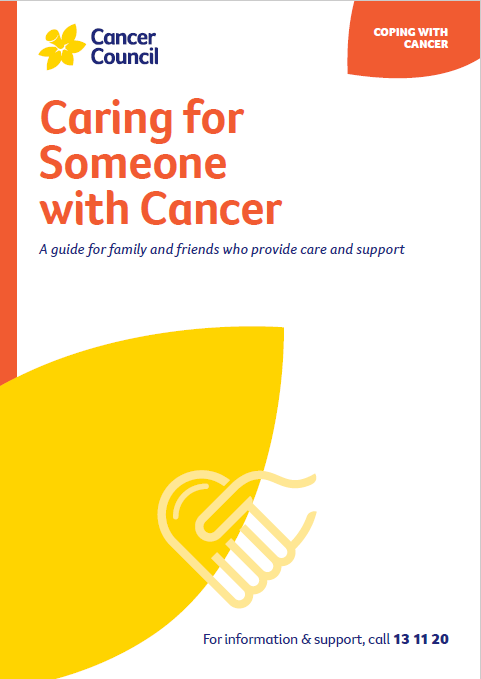- Home
- About Cancer
- Supporting someone with cancer
- Caring for someone with cancer
- Your role as a carer
- Providing medical care
- Monitoring symptoms and side effects
- Managing common symptoms and side effects
Managing common symptoms and side effects
We discuss the best ways to support someone with cancer manage common symptoms and side effects.
Learn more about managing side effects of:
 Pain
Pain
- Support the person with cancer to use pain medicines appropriately. Immediate release medicines work quickly but for a few hours. Slow release medicines provide pain control for a longer period of time, often 12–24 hours.
- If the pain is hard to manage, when you give pain medicine keep a record of the dose and time so you can discuss this with the treatment team. It may take time to find the right pain medicine.
- Always talk to the doctor before stopping or changing the dose.
- Use a pain scale or pain diary to help you and the person you are caring for understand how strong the pain is and the need for extra doses of pain medicine.
- Try hot water bottles or heat packs (check the temperature first), ice packs or gentle massage to relieve pain and discomfort.
- Complementary therapies such as massage or meditation may help.
For more on this, see Pain and cancer and listen to our podcast on Managing cancer pain.
 Fatigue
Fatigue
- Help the person to set small, manageable goals for the day. Suggest they take regular breaks before they become too tired.
- Encourage the person to prioritise activities that they enjoy.
- Find ways for the person to do some gentle physical activity every day – research shows that exercise can reduce fatigue. Talk to the treatment team about what sort of exercise would be suitable. This may include walking or strength- training exercises. See an exercise physiologist or a physiotherapist for other suggestions.
- Help them set up a calm sleeping environment. Ensure the room is dark, quiet and a comfortable temperature. Soothing music or relaxation tracks help some people sleep.
- Investigate services that can help with household chores, cooking or gardening.
For more on this, see Fatigue and cancer and listen to our podcast on Managing cancer fatigue.
 Breathlessness
Breathlessness
- Use a handheld fan to direct a stream of air across the person’s face.
- Place a pillow on a table so the person can lean forward with an arm crossed over the pillow – this allows their breathing muscles to relax.
- Set up a recliner chair to help the person sleep in a more upright position.
- Offer regular drinks throughout the day. Dehydration can contribute to breathlessness.
- Talk to the treatment team about breathing exercises, equipment and ways to manage breathlessness.
- Maintain a calm atmosphere, when possible, as anxiety can make breathlessness worse.
- Ask a doctor or GP about seeing a psychologist to help manage anxiety.
- Encourage them to try relaxation and meditation techniques to help reduce anxiety.
Listen to our Finding Calm During Cancer podcast.
 Nausea and loss of appetite
Nausea and loss of appetite
- Focus on creating a pleasant atmosphere for meals, sitting together and talking.
- Celebrate how much the person eats rather than comment on how much is not finished.
- Encourage the person you are caring for to ask their doctor for different anti-nausea medicines until they find one that works well for them.
- Offer the person their favourite meal or well-tolerated foods often. Most people don’t need a strict diet during cancer treatment, though you should follow the advice of the health professionals.
- Offer small meals or snacks every 2–3 hours during the day.
- Provide regular drinks to help the person avoid becoming dehydrated.
- If the person you care for is losing weight or feels too nauseated to eat, talk to their doctor. The person may need medicine changes or a review by a dietitian or pharmacist to arrange dietary supplements.
For more on this, see Nutrition and cancer and listen to our podcast on Appetite loss and nausea.
→ READ MORE: Managing medicines safely
Podcast: How to Help Someone with Cancer
Listen to more of our podcast for people affected by cancer
Dr Alison White, Palliative Medicine Specialist, Royal Perth Hospital, WA; Tracey Bilson, Consumer; Louise Dillon, Consumer; Louise Durham, Nurse Practitioner, Palliative Care Outpatients, Princess Alexandra Hospital, QLD; Katrina Elias, Carers Program, South Western Sydney Local Health District, NSW Health, NSW; Jessica Elliott, Social Worker, Youth Cancer Services, Crown Princess Mary Cancer Centre, Westmead Hospital, NSW; Brendan Myhill, Social Worker and Bereavement Research Officer, Concord Repatriation General Hospital, NSW; Penny Neller, Project Coordinator, National Palliative Care Projects, Australian Centre for Health Law Research, Queensland University of Technology, QLD; Olivia Palac, Acting Assistant Director, Occupational Therapy, Gold Coast University Hospital, QLD; Nicole Rampton, Advanced Occupational Therapist, Cancer Services, Gold Coast University Hospital, QLD; Shirley Roberts, Nurse Consultant, Medical Oncology, Northern Adelaide Cancer Centre, SA; Dr Elysia Thornton-Benko, Specialist General Practitioner, and UNSW Research Fellow, NSW; Kathleen Wilkins, Consumer; Helen Zahra, Carers Program, South Western Sydney Local Health District, NSW Health, NSW.
View the Cancer Council NSW editorial policy.
View all publications or call 13 11 20 for free printed copies.
